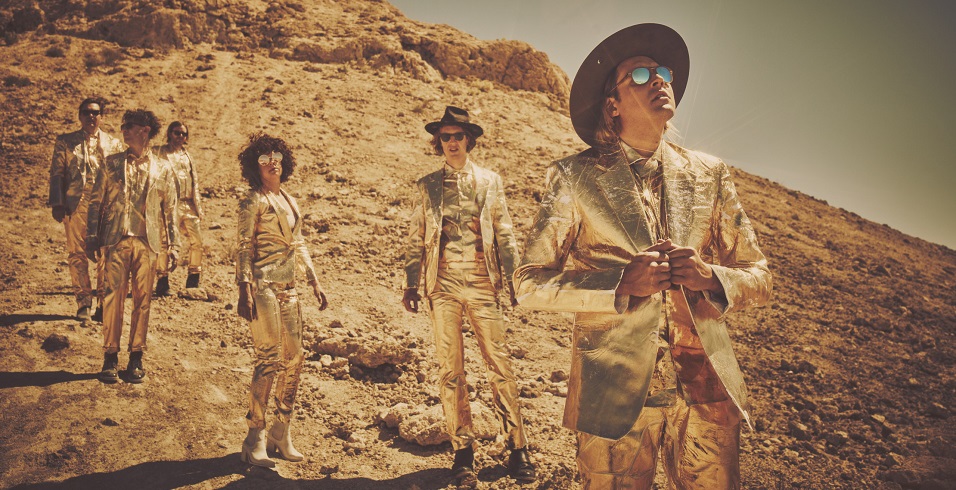Album Review: Arcade Fire – Everything Now
2 min read
With their art-school sensibilities, Canadian sextet Arcade Fire has never been to everybody’s taste. But over the course of the group’s career, their morphing sound has justifiably earned them a loyal fan-base, and plenty of critical acclaim. With their fifth album, Everything Now, Arcade Fire has doubled down on the synthy sound of 2013’s Reflektor, delivering an album that sounds like the band travelled back to the future to reconstitute themselves in the 1980s.
 This tonality was heralded back in May, with the release of the album’s eponymous lead single, which was replete with cheesy keyboard riffs and a dollop of pan pipe at the end of the chorus, which certainly cemented this effect. Throughout the record, the lines between earnestness, critique, and satire become so blurred that Arcade Fire’s apparent theme of excessive consumerism and media consumption – the I want it all and I want it now mentality – gets lost in a self-parodic haze.
This tonality was heralded back in May, with the release of the album’s eponymous lead single, which was replete with cheesy keyboard riffs and a dollop of pan pipe at the end of the chorus, which certainly cemented this effect. Throughout the record, the lines between earnestness, critique, and satire become so blurred that Arcade Fire’s apparent theme of excessive consumerism and media consumption – the I want it all and I want it now mentality – gets lost in a self-parodic haze.
Everything Now falls prey to its own excesses, such as having five tracks share just variations on two titles – Everything Now, Everything Now (Continued), Everything_Now (Continued), Infinite Content, and Infinite_Content. Even for a band with a history of presenting their ideas in a serialised form, the naming convention applied here is a little confusing and irritating. In the case of the Infinite Contents, the repetition extends well into the sphere of the lyrics, with both tracks being different stylistic presentations of the same lyrical refrain – lo-fi garage rock in the first instance, and a bluesy folk rendition in the second.
Many will see the above as Arcade Fire providing a performative example of the critique they are seeking to offer of the media’s tendency toward regurgitating and reforming established ideas, repeating ad nauseam that which rates – there is nothing new under the sun, after all – but the listener may just as well contend that it’s indicative of a band disappearing up its own fundament.
Despite these issues, Arcade Fire manages to deliver a couple of gems and truly intriguing moments, such as the pitch-shifted keys of We Don’t Deserve Love, which creates an unsettling vibe that compliments the lyrics while the track’s shift from synth-rock to alt-country at the chorus generates interest. Good God Damn offers satisfying indie-rock that belies the song’s morose narrative, and the funk infused Signs of Life stands above the album’s other offerings, mimicking contemporary pop in structure, but with great nuance and subtly. Ultimately, in spite of the excellent performance and production offered, Everything Now fails to deliver on Arcade Fire’s reputation.



